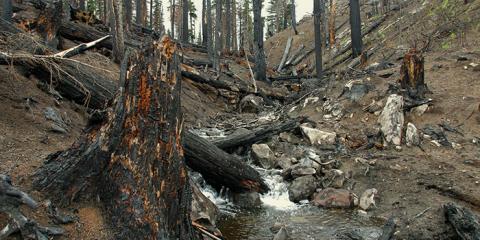Aftermath of wildfire threatens Western water supplies
November 09, 2015
As if the monetary and environmental cost of wildfires weren’t enough to worry about, now comes a study detailing the risks that burned landscapes pose to watersheds.
A new report by the American Forest Foundation, Western Water: Threatened by Wildfire, shows that across the 11 Western states, some 64 million of us depend on surface water that comes from forests and other lands. Wildfires burning across these lands can bake the soil, creating a hard-packed layer that destroys the land’s natural filtration and storage systems.
In an email correspondence this week, Dr. George Ice, formerly with the National Council for Air and Stream Improvement in Corvallis, said that “severe fires consume the forest floor and organic matter in lower soil profiles, which can expose bare soil, alter soil structure, and create a water-repellent layer which retards downward percolation of water.”
To mitigate this impact on burned lands, federal officials in eastern Oregon are presently dumping thousands of pounds of mulch onto lands devastated by the Canyon Creek Complex Fire, which this summer ravaged 110,000 acres and destroyed more than 40 homes.
Local contractors grind up wood and small trees logged from nearby forests, and helicopters dump the mulch on high-intensity burned areas.
The program’s goal is to slow down soil erosion and prevent flooding. An East Oregonian reporter covering the story said that “without enough vegetation to soak up rain and snow, runoff threatens to sweep down the barren hillsides as if it were poured onto concrete.”
Good plan. Or as an alternative, we could just thin the forests before they burn up, producing timber, jobs, healthier forests, clean air and clean water.
For the forest,
Paul Barnum
Executive Director
